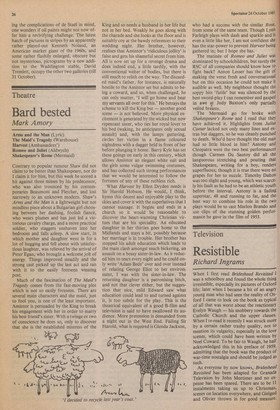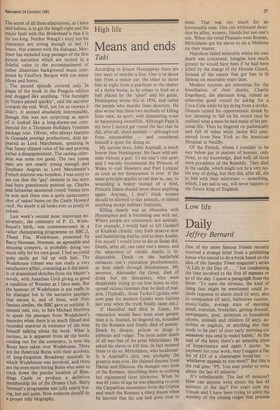Television
Resistible
Richard In grams When I first read Brideshead Revisited I was a schoolboy and found the whole thing irresistible, especially its pictures of Oxford life; later when I became a bit of an angry young man who had seen the reality of Oxford I came to look on the book as typical of all that was worst about the reactionary Evelyn Waugh — his snobbery towards the Catholic Church and the upper classes. When I re-read it recently I was struck more by a certain rather trashy quality, not to mention its vulgarity, especially in the love scenes, which could have been written bY Noel Coward. To be fair to Waugh, he half acknowledged this in his preface of 1959, admitting that the book was the product of war-time nostalgia and should be judged as such.
As everyone by now knows, Brideshead Revisited has been adapted for Granada Television by John Mortimer and no expense has been spared. There are to be 11 instalments taking us up to Christmas, scenes on location everywhere, and Gielgucl and Olivier thrown in for good measure. The secret of all these adaptations, as I have said before, is to get the length right and the major fault with this Brideshead is that it is far too long. Neither Waugh's story nor his characters are strong enough to last 11 hours. Not content with the dialogue, Mortimer has included long passages of the first Person narration which are recited in a doleful voice to the accompaniment of rather disastrous background music composed by Geoffrey Burgon with too many oboes and horns.
The second episode covered only 24 Pages of the book in the Penguin edition and dragged like anything. 'The fortnight in Venice passed quickly', said the narrator towards the end. Well, not for us viewers it didn't. It seemed absolutely interminable, though this was not surprising as much of it looked like a long-drawn-out commercial for a Thomson Holidays Venetian Package tour. Olivier, who always features in Granada prestige productions, duly appeared as Lord Marchmain, speaking in that funny clipped voice of his and proving rather a disappointment. The casting otherwise was none too good. The two young men are not nearly young enough and Stephane Augran as Lord Marchmain's, French mistress was hopeless. I was sorry to see too that the 'gay' element in the story had been gratuitously pointed up. Charles and Sebastian sauntered round Venice arm in arm and there was a quite unnecessary shot of naked bums on the Castle Howard roof. No doubt it all looks ever so pretty in colour.
Last week's second most important anniversary, the centenary of P. G. Wodehouse's birth, was commemorated in a rather cheeseparing programme on BBC 2, Thank You, Wodehouse, presented by Barry Norman. Norman, an agreeable and amusing compere, is probably doing too much telly for his own good. I feel we could quite easily get fed up with him. The Wodehouse tribute was not really a very satisfactory affair, consisting as it did mainly of dramatised sketches from the Master's novels, with Jonathan Cecil giving as good a rendition of Wooster as I have seen. But the humour of Wodehouse is not really in his dialogue but in the narrative passages that encase it, and of these, with their famous similes, the BBC gave us nothing. It seemed odd, too, to hire Michael Hordern to speak the passages from Wodehouse's memoirs when there is so much filmed and recorded material in existence of the man himself talking about his work. What is curious, as is apparent from all the books coming out for the centenary, is how the Bores have taken over Wodehouse. There are the theatrical Bores with their accounts of long-forgotten Broadway musicals in which Wodehouse was involved, and there are the even more boring Bores who want to track down the precise location of Blandings Castle or produce a definitive membership list of the Drones Club. Barry Norman's programme was jolly nearly boring, but not quite. Now someone should do a proper telly biography.



































 Previous page
Previous page